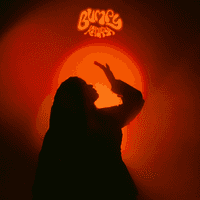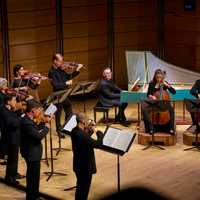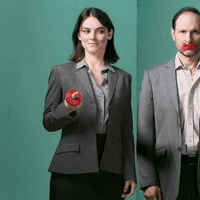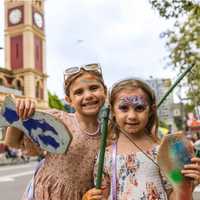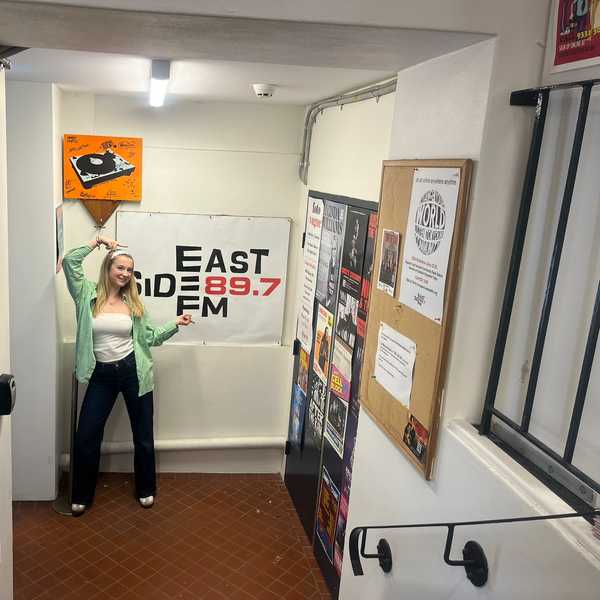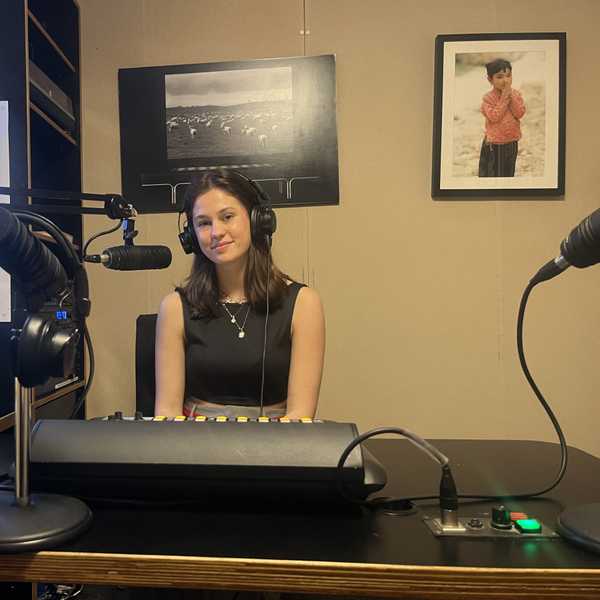Approx. 14 minute read
An interesting theme that connects many parts of my Shout Sister Shout series is the musical influence mothers have had on their daughters. The Godmother of Rock ’n Roll and inspiration for Shout Sister Shout, Sister Rosetta Tharpe, made her start in music all because of mum, Katie Bell Nubin. Mother ‘Bell’, as she was known, was a travelling missionary, mandolin player and gospel shouter. She encouraged Little Rosetta to sing and play guitar setting her on a path to change the trajectory of popular music in her own unique way.
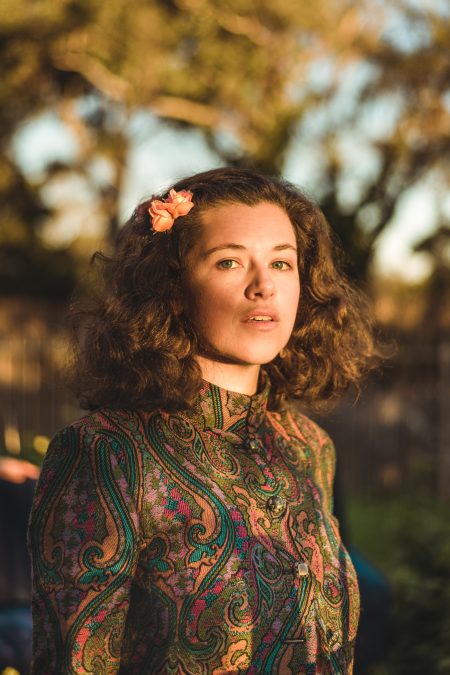
“My mum was…a leading figure in curating my love and understanding of music…”- these are the words that my next interviewee, Emily-Rose Šárkova, had to say about her mum. They jumped right out at me and immediately took me back to some of the words echoing a similar sentiment by other women in jazz, improvised and world music. Mara Kiek describes her mother as her “first teacher and inspiration” who always had a twinkle in her eye and Kristin Berardi shares that she grew up in a musical household with her mother at the organ and piano teaching. Read on to learn about Emily-Rose’s inspired beginnings and dynamic pathway in music.
Sonia de Freitas: Hi Emily-Rose, how are you and where does our interview find you today?
Emily-Rose Šárkova: Hey Sonia! It’s a beautiful early autumn day and I’m sitting at my desk at our home recording studio with a lovely view of my beloved veggie garden overlooking Heathcoate national park. Right now I am madly trying to do final preparations for the launch of my new single with Emily-Rose and the Wild Things – which includes a lot of admin but also a lot of creating for our live-stream party launch. My mind is darting between the to do list for that, as well as what I should be teaching my piano students today and whether or not I should try planting out my very late in the season tomato seedlings.
SdF: Can you tell me about your journey in music? When did you know that you were going to make music your career?
ERS: Well, I remember a defining moment mid year 11 in highschool when I was deeply dissatisfied with my music teacher at school and decided I never wanted to go back to another music class because it wasn’t leading me in the musical direction I wanted. My mum was very supportive at the time, even suggesting I just leave school to focus on music. I was horrified at that suggestion because all I wanted to do was go and study at the Conservatorium of Music – so needed to complete my HSC. So instead we moved schools in the middle of year 11 and changed most of my subjects so that I could pursue music very seriously.
My mum was really a leading figure in curating my love and understanding of music throughout my childhood and young adult years. She was my piano and dance teacher for most of my early life until the age of about 16, which is when I moved my studies to the Australian Institute of Music. I was brought up on a diet of classical music, musical theatre and began to discover jazz in my mid teens. AIM ended up exposing me to a plethora of other genres like rock, metal and fusion and when I auditioned for the Con I was fairly ambitious in auditioning for Classical, Jazz and Composition.
I spent 5 years at the Con, first doing composition, then classical piano and forever taking jazz subjects as my electives. I also picked up the accordion whilst there, joined a klezmer band, discovered a deep love for folk festivals and also became obsessed with dancing tango. During these years I ended up spending all my money (earned from a lot of teaching) on travelling – mostly Europe, including a year on exchange in Germany, and this continued after I graduated, with quite a lot of time in Argentina to study tango music and dance, as well as a tour to Poland with some very inspiring women (singer Fay Sussman and documentary maker Judy Menczel). Travel has become one of the most inspiring ways to connect with different music, cultures and people, and touring in Australia has also allowed me to see much of the country that I would never have otherwise seen and connect with smaller rural communities that are home to really some of the best humans.
I spent the first few years out of uni in the world of folk and world music, with some classical moments, but that tended to fade a little, the deeper I became involved with my band Chaika and with my tango group Tangalo. Chaika is a band I was able to explore both folk and world music with as well as intricate ways of collaborative composition which could go quite outside the box. I spent a whirlwind few years touring with tango musicians from Buenos Aires and running a tango dance and music school and a large tango festival in Sydney. Then in 2018, I spent a wonderful week at a transformative camp (actually it is a folk music camp which seems to have special regenerative powers haha!) called Stringmania. I was amongst some truly excellent humans making music and having conversations about things I felt mattered. It was another defining moment in the direction of my musical life where I decided I needed to change something drastically. I effectively put all tango music and dance teaching on hold, returned to full time music creating with a focus on writing all my own material and pursuing the making of music closer to home.
So, the last 2 years have been some of the most prolific music making times of my life (despite covid putting a dampener on the tour circuit). A deeply impressionable week of music exploration with multi-instrumentalist and producer Jaron Freeman-Fox (Canada) led me to rethink the way I was thinking about, practicing and creating music. I began to appreciate and approach aspects of making music that I grew up misunderstanding, dismissing or being fearful of. Through playing with my dear friend Ren Stone’s band Rhythm Hunters, I discovered the beauty of electric keyboard and synthesizer possibilities, which I am thoroughly enjoying exploring with my new group Emily-Rose and the Wild Things. Although challenging, the melding of acoustic and electric worlds is a fascinating and exciting journey for me, and when combined with my love of creative writing through lyrics, I feel that I am finally on a path of making music that feels relevant and sincere for where I exist in this big wide world.
SdF: Can you tell me about your creative process when producing your work?
ERS: Creative process is such a loaded word isn’t it?! It can mean so many things for different people. I would say that at the crux of my creative process is absorption of a wide variety of musical information, styles and genres which then manifest themselves in informed improvisation. So, all of my experiences in different areas of music that I don’t necessarily have personal or cultural ties to (but am drawn to playing and exploring), then find themselves melding together to create a variety of ideas in my mind, voice and fingers which become personal to me.
These past couple of years I have written a great deal of lyric based music – of which so many lyrics and melodies were composed on long drives and recorded to voice memos. Long drives is also how I memorise lyrics, chords, melodies etc. So I have often composed entire verses and choruses, arrived home and then tried a variety of harmonic possibilities with it on the piano. With all that being said, I also find it incredibly liberating to just experiment with an instrument I am not as familiar with (at the moment it tends to be guitar, banjo or synth patches I am not familiar with) and see what direction that inspires me to go in.
I also really HAVE to say, that my creations don’t then exist in one permanent form. The musicians who gather around me to play the music with me add their incredible layers of creativity. Much of the time the music grows and changes to such an extent that my band members are just as much the creators of the music as I.
SdF: Who is your sounding board? There must be someone that you trust to give you brutally honest feedback on your music. How do they fit into the process?
ERS: I have had a few throughout my life. The one person who will always be brutally honest is my mother. Sometimes her musical tastes can filter in though, so sometimes I need to take it with a grain of salt. But she knows when something is excellent and when something can and needs to be better executed or re-thought. The other two people in my life at the moment who I really value their feedback and who’s input is fairly essential at the moment is my partner Nick Henderson (he plays bass and sings in the Wild Things plus we write songs in a duo called Little Clouds) and my dear long time friend Chris Stone (also violinist in the Wild Things). Both of them are also audio nerds – in a good way as they have recorded and mixed my recent album – and have a really extensive knowledge in different areas of music making. They are thoughtful and intense music makers who know me well and encourage the best of me.
SdF: What female musician made the biggest impact on your life?
ERS: I can’t possibly give you only one. Since my teen years I have admired greatly the brilliance of Katie Noonan. From being a huge fan of her band George with brother Tyrone, to her duets with her mother, her band Elixir with her partner, countless collaborations – many with other fantastic female musicians – and the way she lifts young musicians with the School of Rock Eumundi. When I recently heard she was to be Artistic Director of the National Folk Festival, I was bounding with joy. She is a musician who has constantly inspired me from afar (I often think if I could one day share the stage with her that would be a dream come true). Closer to home though, I have to say that my university friend Sarah Myerson (now Cantor Myerson based in New York) introduced me to the world of folk – and that has shaped a huge part of my life. Then the three female members of Chaika – Laura Altman, Susie Bishop and Laura Bishop are continuous inspirations to me. They are all so different, so strong in their chosen pursuits in music and so giving of their time and creativity. Laura Altman in particular introduced me to the band George in our high school years – so there we go with a full circle!
SdF: Have you experienced particular challenges as a female musician? How did you overcome these challenges and what do you think needs to change for others to avoid these challenges in the future?
ERS: Off the top of my head, I would say there are a handful of things that have been intimidating and have really put me off things in the music industry.
1: Encounters with rude sound guys who assume you don’t understand anything in the audio world because of your genitalia – this is made even more obvious when they only direct questions and listen to males on stage or when you encounter friendly approachable sound guys who do a wonderful job and listen to your requests. I have to say though – I think this breed is on their way out. In recent years my on stage experience has definitely been much more amicable.
2: Jazz jams where there are a thousand male saxophonists trying to play each other under the table. Male egos at jam sessions are probably why I decided that it wasn’t the place for me to hang out. I think that our scene in Australia is actually much better in this regards to some other places – but there is still a long way to go. I was actually slightly horrified when I was in New York recently and I could only find 1 female jazz pianist to go and watch in my entire 2 weeks stay there.
3: Not having a strong female role model or teacher to help me in my formative years at University. Nearly all my performance teachers at university were male – bar one jazz vocal ensemble class with the legend that is Judy Bailey. They were fantastic teachers, but there was a huge gender imbalance in the staff there as well as the students in the jazz course. I have a student in the jazz course at UNSW and she is still the only female in her ensembles. This really just blows my mind. We do definitely need more female music teachers in university and school roles, as well as on stage and I think that it is a bit of a cycle – if we only have a small amount of females in these courses, that means a small number ending up in teaching roles as well. I’m really excited to see young people like Laura Altman and Chloe Kim on staff at the Conservatorium now. More of this needs to happen.
4: Being expected to present in ways that males are never expected in performance settings. I have had friends being told they needed to shave their legs to be part of certain ensembles – can you imagine a man being told to do that? I’ve also been heckled by drunk men about what I should play or how I look (and I read a similarly harrowing account by a fellow musician just yesterday about the same occurrence). I would say there could definitely be some serious codes of conduct upheld by venues to promote a respectful environment.

SdF: So, what’s on the horizon for you? Any projects you’re working on or new releases to share? Include links if appropriate.
ERS: I’m releasing my first album with my band Emily-Rose and the Wild Things! It’s fairly exciting – it was all recorded at my home studio mid 2020 between lockdown 1 and 2. I’ll be releasing some singles first – the first one on March 10 called Complete as One. There is also a Release Party we are live-streaming where Nick and I have created a whole set of party music based from the track – it will remain up on my Youtube after the live stream. Something that we’ve been working on hard together is our live-stream program which we have been doing most Wednesday nights at 7pm EST. Our idea is to showcase both music we are working on in different iterations of our musical selves and also to showcase some local musicians throughout the program too. We do it all from our home studio Peppermint Grove Studios.
SdF: What is your most memorable performance and why?
ERS: I have three very different ones. Emily-Rose and the Wild Things playing at Majors Creek Folk Festival 2019 – the evening set. My favourite sound people (Robin Janus and Mischa Herman) were making us all super comfortable, the audience was listening deeply and visibly loving it, and the band was having an absolutely excellent time on stage. Then two from Chaika – one very special house concert we did for our friend and constant supporter Martin Wesley-Smith and his family – he was a fantastic composer and activist now passed on. The second was Chaika’s last performance before COVID lockdown – it was a private acoustic gig for Warbuton’s River Folk Festival organiser Sam and his wife Phoebe with new born baby Ooruk. It was the first time they had had visitors to the house since the birth and it was a surprise concert for her. There were a lot of tears and incredibly special moments – I think that Phoebe was our most appreciative audience member ever.
SdF: What advice would you give to any aspiring musicians out there?
ERS: Know that when you want to be a musician, that also means wearing many hats. I’ve found myself having to be a marketer, designer, manager, tour booker, teacher, audio engineer, videographer and needing to be versatile in the musical skill sets I have to make my way in the industry.
Know that something that is prestigious (like an award or performing at a certain venue), although wonderful, isn’t always the best way to measure your success. Also, know that the musical world is actually full of really incredibly generous, wonderful humans and when you find them, keep them close – and no matter what, when you feel that something isn’t right about a situation – walk away with confidence.
To learn more about Emily-Rose Šárkova visit: musicbyemilyrose.com.au
To buy Emily-Rose Šárkova’s music visit: emily-roseandthewildthings.bandcamp.com & chaika.bandcamp.com
To catch one of Emily-Rose Šárkova’s live streams tune into her Youtube channel: youtube.com/c/musicbyemilyrose
For more information on International Women’s Day visit: internationalwomensday.com
Keep an eye out for my next interview in the Shout Sister Shout series where I interview Angela Rosero.
Did you miss the previous Shout Sister Shout instalment? Read Loretta Palmeiro’s interview here.
Share "Shout Sister Shout: Emily-Rose Šárkova (IWD 2021)"
Copy

